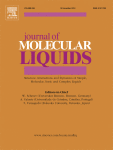|
Authors
Ferreira, M.L.; Llovell, F. ; Vega, L.F.; Pereiro, A.B.; Araújo, J.M.M. ; Vega, L.F.; Pereiro, A.B.; Araújo, J.M.M.
|
Abstract
This work focuses on the design and development of fluorinated ionic liquids (FILs) as alternatives to perfluorocarbons (PFCs), widely used in industrial applications. A combined theoretical-experimental approach has been used to characterize ionic liquids (ILs), considering their thermodynamic behaviour in the presence of atmospheric gases (oxygen (O2), nitrogen (N2) and carbon dioxide (CO2)). The selected ILs are based on perfluorobutanesulfonate ([C4F9SO3]−), perfluoropentanoate ([C4F9CO2]−), trifluoromethanesulfonate ([CF3SO3]−) and trifluoroacetate ([CF3CO2]−) anions, combined with imidazolium ([CnC1Im]+, n = 2 and 4) and pyridinium ([C2C1py]+) cations. The soft-SAFT (Statistical Associating Fluid Theory) molecular-based equation of state has been used to determine the solubility behaviour of atmospheric gases in the ILs. Models for three FILs not yet parametrized, [C2C1py][C4F9SO3], [C2C1Im][C4F9CO2] and [C2C1py][C4F9CO2], have been built from transferable molecular models. The solubility of O2, N2 and CO2 in the ILs has been determined, in excellent agreement with experimental data, indicating the robustness of the soft-SAFT approach. The highest solubilities have been obtained for the FILs based on the perfluorobutanesulfonate anion ([C4F9SO3]−) combined with 1-ethyl-3-methylpyridinium cation ([C2C1py]+) and 1-butyl-3-methylimidazolium cation ([C4C1Im]+). This approach grants to evolve highly predictive IL models inherently, regarding the process of parametrization from the molecular structure, which allows to describe the behaviour of these complex systems in a faster and more robust way.
|

WoS
Scopus
Altmetrics
 
|
